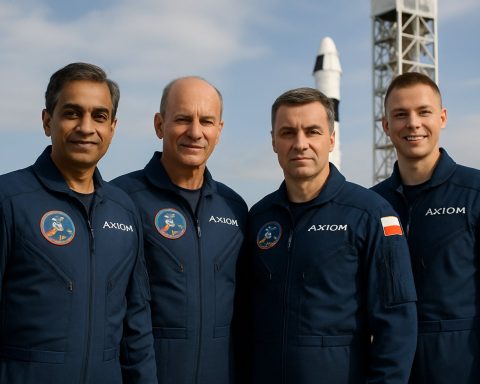- The travel and tourism industry is undergoing significant transformation driven by technological advancements.
- Key innovations include AI-driven tools like TripGenie, which enhance trip planning with human-level intelligence.
- Quantum computing promises to revolutionize air traffic management, supporting ventures like space tourism and deep-sea exploration.
- Supersonic flights, championed by companies like Boom Technology, aim to eliminate long layovers with rapid travel.
- Smart cities with driverless cars and advanced air mobility enhance accessibility and destination exploration.
- The integration of technology and sustainability is advancing, exemplified by Virgin Atlantic’s use of sustainable aviation fuel.
- Space travel is becoming feasible, transforming commercial space experiences into a new travel frontier.
- The report emphasizes embracing these innovations to lead in a new era of exploration defined by convenience and sustainability.
Prepare for a seismic shift in the realm of travel and tourism. The World Travel & Tourism Council (WTTC) and Trip.com Group have shed light on trailblazing technologies in their latest report, “Technology Game Changers: Future Trends in Travel & Tourism.” As these innovations unfold, the future of travel promises to be an exhilarating journey, marked by artificial intelligence, supersonic speeds, and even the vast expanse of space.
Step into a world where AI doesn’t just assist with your travel bookings but stands on par with human intelligence, revolutionizing the way we plan our vacations. Imagine an AI assistant that’s as intuitive as your best travel buddy, guiding you through an effortlessly personalized journey. The industry is already seeing a dramatic rise in AI-driven tools like TripGenie, reshaping the travel landscape with a 200 percent increase in usage in just one year.
Quantum computing beckons another frontier, poised to unravel the complexities of air traffic management with unmatched precision. This powerful technology hints at a future where space tourism and deep-sea exploration aren’t just figments of imagination but tangible realities for the adventurous traveler. Coupled with the impending resurgence of supersonic flights, thanks to pioneers like Boom Technology and United Airlines, travelers will soon zip across the globe at spectacular speeds, making long layovers a relic of the past.
Smart cities are also on the horizon, where driverless cars and advanced air mobility redefine accessibility and convenience. These cities will transform once remote destinations into hubs of exploration, inviting travelers to chart new paths across uncharted territories.
The leaders at WTTC highlight the ongoing digital revolution in the travel sector. The seismic shift from traditional methods to virally-driven personal experiences is reshaping how we journey through the world. Platforms like Instagram are transforming from simple social networks into immersive travel galleries, selling not products but experiences that entice and inspire.
Meanwhile, the marriage of technology and sustainability strides forward. Recent advancements such as Virgin Atlantic’s pioneering use of 100 percent sustainable aviation fuel underscore a sector-wide commitment to eco-friendly exploration. Ports like Miami are expanding their capabilities with greener infrastructures, heralding a new era in sustainable tourism.
Space travel, once relegated to the realm of science fiction, is fast becoming a genuine opportunity for the intrepid explorer. As demand for commercial space experiences accelerates, the infrastructure evolves to meet this exciting frontier. Soon, space voyages from the International Space Station to perhaps lunar escapades will transform the ultimate travel bucket list.
For the modern traveler, the convergence of these technologies signals an era where convenience, speed, and sustainability are not aspirations but expectations. As businesses pivot to integrate these advancements, they aren’t merely keeping pace—they are setting new standards for what journeying across our world and beyond truly means.
This report offers a clarion call: the future is now. Embrace these innovations, and prepare yourself to redefine the very essence of travel. Those who grasp these emerging tools will lead this exhilarating charge into a new era of exploration.
Revolutionizing Travel: How AI, Quantum Computing, and Sustainability are Reshaping Tourism in 2024
Embracing the Future of Travel with Game-Changing Technologies
The travel and tourism industry is on the brink of a paradigm shift, driven by groundbreaking technologies set to redefine how we explore the world. The recent report from the World Travel & Tourism Council (WTTC) and Trip.com Group titled “Technology Game Changers: Future Trends in Travel & Tourism” highlights innovations that promise not only to enhance convenience and speed but also to instill a deeper commitment to sustainability.
How AI Transforms the Travel Experience
Artificial Intelligence (AI) is revolutionizing travel planning by offering hyper-personalized experiences akin to having your own travel genie. Tools like TripGenie, with a staggering 200% increase in usage over the past year, ensure travelers receive tailored recommendations and real-time updates, reducing the hassle of itinerary management.
Real-World Use Cases:
– Personalized Itineraries: AI can analyze user preferences and past travel behavior to suggest unique travel experiences.
– Seamless Booking: AI assistants streamline the booking process by handling inquiries, modifications, and even last-minute changes.
The Rise of Quantum Computing in Air Traffic Management
Quantum computing promises to address the complexities of air traffic management, providing solutions that leverage its computational power to optimize flight schedules and enhance safety protocols. This technology is crucial in making emerging trends like supersonic and space travel viable on a larger scale.
Insights & Predictions:
– Supersonic Flights: With companies like Boom Technology and United Airlines spearheading the development, expect flight times to reduce dramatically, making intercontinental travel quicker than ever.
– Air Traffic Efficiency: Quantum computing can potentially reduce flight delays and increase efficiency in crowded airspaces.
Sustainability in Travel: A New Era
Sustainability is no longer a buzzword but a necessity in modern travel. Innovations such as Virgin Atlantic’s use of 100% sustainable aviation fuel and the enhancement of green port facilities in places like Miami highlight a sector-wide shift towards eco-friendly practices.
Security & Sustainability:
– Sustainable Aviation: The move towards biofuels and more efficient engines reduce the carbon footprint of air travel.
– Green Infrastructure: Cities and ports are investing in sustainable practices to cater to the environmentally conscious traveler.
Space: The Final Travel Frontier
Space tourism is transitioning from science fiction to reality, as commercial demand rises and infrastructure evolves to support such experiences. Companies are making strides to offer space voyages, potentially extending to lunar missions, creating the ultimate adventure.
Market Forecast & Industry Trends:
– Space Commercialization: Companies like SpaceX and Blue Origin are at the forefront, with plans for orbital trips and beyond.
– Consumer Interest: With decreasing costs and increasing accessibility, space travel will soon be an exciting addition to travel itineraries.
Pressing Questions Readers May Have
– How can travelers leverage AI for a better experience?
By utilizing AI platforms, travelers can access personalized experiences, receive real-time updates on travel plans, and streamline booking processes.
– What investments are being made to ensure space travel safety?
Companies invest heavily in R&D for spacecraft durability, safety protocols, and astronaut training to ensure secure commercial spaceflight experiences.
Actionable Recommendations: Quick Tips for the Modern Traveler
1. Adopt AI Tools: Incorporate AI-based travel assistants for seamless and stress-free travel planning.
2. Opt for Sustainable Travel Options: Choose airlines and destinations committed to sustainability.
3. Stay Informed: Keep abreast of emerging travel technologies and trends to make informed decisions.
4. Plan for the Future: Space travel might not be affordable for everyone yet, but keeping an eye on developments will help prepare for when it becomes accessible.
For those ready to lead the charge into this new era of travel, your journey is set to become more exhilarating and eco-friendly. Embrace these groundbreaking changes, and redefine what it means to explore the world and beyond.
For more information on how AI and other technologies are transforming industries, visit WTTC and Trip.com.










